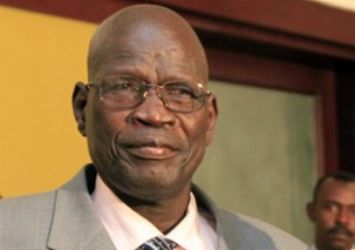South accuses Sudan of failing to withdraw troops from border
March 22, 2013 (JUBA) – South Sudan on Friday accused the government of neighbouring Sudan of failing to pull its troops back from their contested border in line with an agreement to create a buffer zone to defuse tensions between the two nations.

As part of the deal, South Sudan is also scheduled to resume exporting its oil through Sudan for the first time in over a year.
South Sudan’s defence minister, John Kong Nyuon, said his country had completed its withdrawal from all border areas in order to allow for the creation of the buffer zone.
Nyuon was speaking to journalists shortly after briefing president Salva Kiir Mayardit about the outcomes and recommendations made in the recent Joint Political Security Mechanism (JPSM) meeting, which he attended in the Ethiopian capital, Addis Ababa.
The minister said that the United Nations Interim Security Force for Abyei (UNISFA), which has been given the responsibility of monitoring the buffer zone as well as the Abyei area, has airlifted South Sudanese monitors to the South Kordofan capital Kadugli, which has been designated as the interim headquarters of the joint monitoring operation.
“The SPLA (South Sudanese army) forces have so far completed withdrawal from the areas. We have withdrawn our forces from Northern Upper Nile. We have withdrawn our forces from Jau and all the areas, including 14 Mile area which was given special security arrangement in Northern Bahr el Ghazal. The same thing in Western Bahr el Ghazal state but the Sudan Armed Forces (SAF), until on March 19, when we were in the meeting, did not move. They did not start withdrawing”, Nyuon told journalists on Friday.
The senior official was accompanied by the army’s chief of general staff, James Hoth Mai, and the newly-appointed chief of Military Intelligence (MI), Major General Mac Paul, both of whom did not make any statement to the media.
“I am told that Sudan Armed Forces have started preparations to withdrawn from Teshkuin in Unity state”, he said, adding that troop withdrawal from the area had not yet commenced.
In Khartoum, General Emad Al-Deen Addawim, who co-chairs the technical JPSM team, confirmed to Sudanese radio the full withdrawal of Mile 14, saying it showed South Sudan was serious about implementing the 8 and 12 March agreements.
The two sides had a week to pull their troops out of the disputed border areas, while the SPLA was given two weeks to withdraw from the Mile 14 area.
SPLA spokesperson Colonel Philip Aguer told Sudan Tribune that it was the responsibility of UNISFA to verify whether SAF had withdrawn.
“On our side, we have completed the withdrawal within the timeframe. It was done in a transparent way. The media were all invited [and] they can prove full withdrawal on our side. The failure by Sudan is the responsibility of the United Nations Interim Force for Abyei which has a mandate to verify and ask for failure”, said Aguer on Friday.
Meanwhile, the senior military officer downplayed reports and complaints from local authorities, expressing fears that civilian populations along the border areas would be vulnerable to attacks by militia groups north of the border who are allied to the Sudanese army.
“The civil populations along the border areas are not vulnerable. The SPLA forces will always be there at [the] moment they feel that their lives are in danger. They will [be there] in the very second of feeling the danger. It is the mandate of the SPLA to protect civilians and their properties from foreign aggression”, said Aguer.
(ST)
